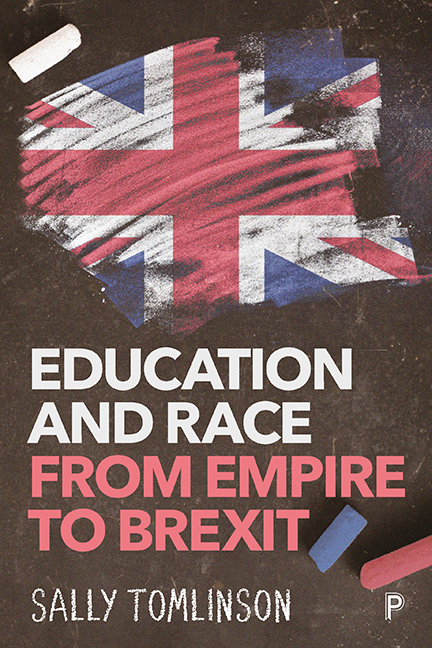Book contents
- Frontmatter
- Contents
- Acknowledgements
- List of abbreviations
- Introduction
- 1 Empire and ethnocentric education
- 2 Internal colonialism and its effects
- 3 Ending empire: Education for ignorance, 1945-1960s
- 4 Post-imperial anxieties and conflicts, 1970-90
- 5 Inequalities, a European Union and education markets, 1990-97
- 6 New Labour: Wars, race and education, 1997-2005
- 7 Not so New Labour: Race and education, 2005-10
- 8 A divided society: Race, class and education, 2010-16
- 9 A dog’s breakfast Brexit, 2016-18
- References
- Index
5 - Inequalities, a European Union and education markets, 1990-97
Published online by Cambridge University Press: 27 April 2022
- Frontmatter
- Contents
- Acknowledgements
- List of abbreviations
- Introduction
- 1 Empire and ethnocentric education
- 2 Internal colonialism and its effects
- 3 Ending empire: Education for ignorance, 1945-1960s
- 4 Post-imperial anxieties and conflicts, 1970-90
- 5 Inequalities, a European Union and education markets, 1990-97
- 6 New Labour: Wars, race and education, 1997-2005
- 7 Not so New Labour: Race and education, 2005-10
- 8 A divided society: Race, class and education, 2010-16
- 9 A dog’s breakfast Brexit, 2016-18
- References
- Index
Summary
Historians may probably decide that not much of lasting significance happened in Britain during John Major's seven years. (Hastings, 2007)
Since my son Stephen was killed with such arrogance and contempt, I’ve had a different life … it was as if I had to put on armour every day in order to survive. (Lawrence, 2007: ix)
The comment from historian and author Max Hastings for once got it wrong. A great deal happened during the seven years of John Major's premiership. He took over as Prime Minister in November 1990 after excusing himself with toothache in hospital while his colleagues removed Margaret Thatcher from her post. Despite being regarded as a ‘grey man’ of politics, with cartoonists depicting him as wearing his underpants outside his trousers, global conflicts, financial mistakes, the European Union, immigration and asylum-seeking, race and religious issues all marked his time in office. Another view of the period was that ‘sleaze built up slowly through the 1990s’ (Tiratsoo, 1997: 208), and Major became a prisoner of a strident and undisciplined Eurosceptic right. What was to be a most contentious policy, the signing up before the 1992 General Election to the Maastricht Treaty that created a European Union, did not figure much in this election, which Major won against all expectations. He inherited from Thatcher support for a Single Market to replace the old rules of a Common Market, where separate countries had their own trade rules, and this boosted trade, employment and investment over the decade. But in signing the Treaty he argued for an ‘opt out’ from a single euro currency and a Social Chapter that included workers’ rights. He also pushed the Thatcher privatisation of public utilities even further, selling off the railways to private companies, and replacing an unpopular ‘Poll Tax’ with a Council Tax on households.
The education policies of Major's years in office helped to dismantle the influence of local authorities on education, created education markets and school privatisation, and set the stage for a break-up of a state education system.
A further crucial event during the period was the murder in 1993 of 18-year-old black student Stephen Lawrence by five white youths. This led to the 25-year search for justice against the police and judicial racism led by his mother, now Baroness Doreen Lawrence.
- Type
- Chapter
- Information
- Education and Race from Empire to Brexit , pp. 115 - 140Publisher: Bristol University PressPrint publication year: 2019



